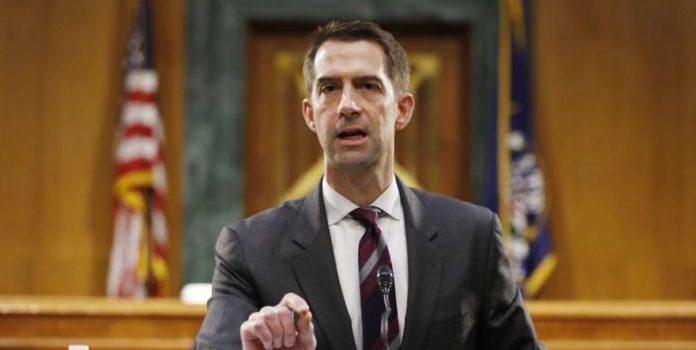(Tony Sifert, Headline USA) Sen. Tom Cotton, R-Ark., has again attacked the Biden Administration’s proposal to cancel student debt, arguing that it would contribute to skyrocketing inflation, according to a report in Breitbart News.
“It would be inflationary to the economy and inflation is clearly a drag on economic growth right now,” Cotton said during an appearance on Fox News’ American Newsroom. “Canceling that student loan debt would also be outrageously unfair to most Americans who didn’t go to college, who don’t have a college degree, who don’t have student loans.”
“If anything, it should be the colleges and universities who so poorly served those students to help repay those loans,” Cotton continued.
On April 5, Cotton called President Biden’s plan “a terrible idea.”
“This is a terrible idea,” Cotton tweeted. “Permanent ‘moratoriums’ put taxpayers on the hook for trillions while letting college grads—even rich ones—avoid paying their debts.”
🚨The Biden Administration is considering *extending* the student loan moratorium. This is a terrible idea.
There’s no free lunch. Permanent “moratoriums” put taxpayers on the hook for trillions while letting college grads—even rich ones—avoid paying their debts.
— Tom Cotton (@TomCottonAR) February 15, 2022
In a similar vein, Real Clear Politics reporter Phil Wegmann asked White House press secretary Jen Psaki about the basic unfairness of student loan forgiveness during a press briefing.
“Is the President looking at any options for those students and parents who saved and sacrificed so that they wouldn’t have to take out such massive loans?” Wegmann asked. “Is he looking at including them in relief retroactively?”
“What I can tell you at this point is that there’s legislation he’d be happy to sign for individuals who have $10,000 in existing student debt,” Psaki responded.
Arizona Senate candidate Blake Masters has argued that student debt forgiveness amounts to massive wealth transfer “from hard-working middle-class to what I call the laptop class.”
Data from a Brookings Institute report agreed with Masters’ claim.
“The highest-income 40 percent of households (those with incomes above $74,000) owe almost 60 percent of the outstanding education debt and make almost three-quarters of the payments,” Brookings found. “The lowest-income 40 percent of households hold just under 20 percent of the outstanding debt and make only 10 percent of the payments.”

